Michael Swanwick's Blog, page 66
February 18, 2020
A First Review for The Postutopian Adventures of Darger and Surplus
.
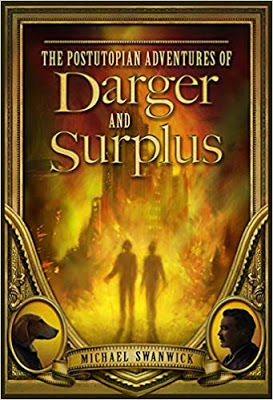
Over on Reddit, my PS Publications collection The Postutopian Adventures of Darger and Surplus received its very first (so far as I know) review, from somebody who is probably named Mike. The review came under the rubric of One Mike to Rule Them All, anyway, so it seems likely.
Here's how the review begins.
And it concludes that mine is "a fun little book." It is little and it's meant to be fun, so I have nothing to complain about.
You can read the entire review here.
*

Over on Reddit, my PS Publications collection The Postutopian Adventures of Darger and Surplus received its very first (so far as I know) review, from somebody who is probably named Mike. The review came under the rubric of One Mike to Rule Them All, anyway, so it seems likely.
Here's how the review begins.
And it concludes that mine is "a fun little book." It is little and it's meant to be fun, so I have nothing to complain about.
You can read the entire review here.
*
Published on February 18, 2020 11:52
February 12, 2020
My Boskone Schedule
.

As always, I'm on the road again. This time I'm off to Boskone for a weekend of intellectual adventure. Checking the weather report, however, I discover that we probably won't have the traditional winter blizzard to contend with.
I dunno. It just won't feel the same without being able to sit in the lobby bar, Martini in hand, watching the slow come in and obliterate the city.
Still, one stand up to adversity. Or the lack of it. In any case, here's my schedule:
Understanding the Future Through Hard Science FictionFriday 18:00 - 18:50, Marina 1 (Westin)
The driving force in hard science fiction is science that is not just possible, but highly probable at some point in a likely future. What actual predictive value can hard SF claim? What does it tell us about our near- and far-term futures, technologically speaking? Is it safe to assume that if we can dream it, future scientists can build it? And even if they can: should they? Finally, what line should be drawn between science and fiction, if any?
Vincent Docherty (M) Frank Wu, Dr. Martin Elvis (Smithsonian Astrophysical Observatory), Jon Singer, Michael Swanwick
Great Novels That Don't WorkSaturday 10:00 - 10:50, Harbor II (Westin)
Which marvelous masterpieces of science fiction, fantasy, or horror don’t really measure up? Why? Do they feature faults that genre fans forgive more readily than regular readers? Did these stories get sprinkled with plot hole dust by the That Don't Work Fairy? Are they still great, in spite of not working? Or even—as in the Japanese philosophy of wabi-sabi, where flaws perfect the whole—because they don’t work?
Grady Hendrix (M),Allen M. Steele, Bracken MacLeod, Michael Swanwick, Brianna Wu
Developing Future HistoriesSaturday 13:00 - 13:50, Marina 3 (Westin)
Is it still possible to write a future history? Is it still worthwhile? How do you build a future history, anyway? How about alternate futures based on alternate pasts? Let's dive into the great what-ifs and maybes of tomorrow!
Mark Olson (M), Dr Jonathan McDowell (Center for Astrophysics, Harvard and Smithsonian), David B. Coe/ D.B. Jackson, Sharon Lee (Liaden Universe), Michael Swanwick
Slightly Subversive FantasySaturday 16:00 - 16:50, Harbor I (Westin)
In the words of Ursula Le Guin, "Resistance and change often begin in art. Very often in our art — the art of words." Arguably, science fiction and fantasy are at their very hearts genres of subversion, challenging the status quo. Let's talk about the art of subversion, and how we as artists and readers support and promote social change through the creation of ideas and the power of imagination.
Paul Di Filippo (M), Walter Jon Williams (Word Domination, Ltd.), Jeffrey Ford, Michael Swanwick, Suzanne Palmer
From Book to the Silver ScreenSunday 11:00 - 11:50, Harbor I (Westin)
What actually happens when a novel is picked up and made into a film? It doesn't always turn out the way readers, viewers, or the original writer imagines. From characters to plot changes, the act of adaptation has the potential to transform key elements of the story. So how can authors stay involved in the process, when should they step away, and what should fans expect?
Holly Black, Charlaine Harris, , Michael Swanwick, Rajnar Vajra (M)

As always, I'm on the road again. This time I'm off to Boskone for a weekend of intellectual adventure. Checking the weather report, however, I discover that we probably won't have the traditional winter blizzard to contend with.
I dunno. It just won't feel the same without being able to sit in the lobby bar, Martini in hand, watching the slow come in and obliterate the city.
Still, one stand up to adversity. Or the lack of it. In any case, here's my schedule:
Understanding the Future Through Hard Science FictionFriday 18:00 - 18:50, Marina 1 (Westin)
The driving force in hard science fiction is science that is not just possible, but highly probable at some point in a likely future. What actual predictive value can hard SF claim? What does it tell us about our near- and far-term futures, technologically speaking? Is it safe to assume that if we can dream it, future scientists can build it? And even if they can: should they? Finally, what line should be drawn between science and fiction, if any?
Vincent Docherty (M) Frank Wu, Dr. Martin Elvis (Smithsonian Astrophysical Observatory), Jon Singer, Michael Swanwick
Great Novels That Don't WorkSaturday 10:00 - 10:50, Harbor II (Westin)
Which marvelous masterpieces of science fiction, fantasy, or horror don’t really measure up? Why? Do they feature faults that genre fans forgive more readily than regular readers? Did these stories get sprinkled with plot hole dust by the That Don't Work Fairy? Are they still great, in spite of not working? Or even—as in the Japanese philosophy of wabi-sabi, where flaws perfect the whole—because they don’t work?
Grady Hendrix (M),Allen M. Steele, Bracken MacLeod, Michael Swanwick, Brianna Wu
Developing Future HistoriesSaturday 13:00 - 13:50, Marina 3 (Westin)
Is it still possible to write a future history? Is it still worthwhile? How do you build a future history, anyway? How about alternate futures based on alternate pasts? Let's dive into the great what-ifs and maybes of tomorrow!
Mark Olson (M), Dr Jonathan McDowell (Center for Astrophysics, Harvard and Smithsonian), David B. Coe/ D.B. Jackson, Sharon Lee (Liaden Universe), Michael Swanwick
Slightly Subversive FantasySaturday 16:00 - 16:50, Harbor I (Westin)
In the words of Ursula Le Guin, "Resistance and change often begin in art. Very often in our art — the art of words." Arguably, science fiction and fantasy are at their very hearts genres of subversion, challenging the status quo. Let's talk about the art of subversion, and how we as artists and readers support and promote social change through the creation of ideas and the power of imagination.
Paul Di Filippo (M), Walter Jon Williams (Word Domination, Ltd.), Jeffrey Ford, Michael Swanwick, Suzanne Palmer
From Book to the Silver ScreenSunday 11:00 - 11:50, Harbor I (Westin)
What actually happens when a novel is picked up and made into a film? It doesn't always turn out the way readers, viewers, or the original writer imagines. From characters to plot changes, the act of adaptation has the potential to transform key elements of the story. So how can authors stay involved in the process, when should they step away, and what should fans expect?
Holly Black, Charlaine Harris, , Michael Swanwick, Rajnar Vajra (M)
Published on February 12, 2020 00:30
My Boxkone Schedule
.

As always, I'm on the road again. This time I'm off to Boskone for a weekend of intellectual adventure. Checking the weather report, however, I discover that we probably won't have the traditional winter blizzard to contend with.
I dunno. It just won't feel the same without being able to sit in the lobby bar, Martini in hand, watching the slow come in and obliterate the city.
Still, one stand up to adversity. Or the lack of it. In any case, here's my schedule:
Understanding the Future Through Hard Science FictionFriday 18:00 - 18:50, Marina 1 (Westin)
The driving force in hard science fiction is science that is not just possible, but highly probable at some point in a likely future. What actual predictive value can hard SF claim? What does it tell us about our near- and far-term futures, technologically speaking? Is it safe to assume that if we can dream it, future scientists can build it? And even if they can: should they? Finally, what line should be drawn between science and fiction, if any?
Vincent Docherty (M) Frank Wu, Dr. Martin Elvis (Smithsonian Astrophysical Observatory), Jon Singer, Michael Swanwick
Great Novels That Don't WorkSaturday 10:00 - 10:50, Harbor II (Westin)
Which marvelous masterpieces of science fiction, fantasy, or horror don’t really measure up? Why? Do they feature faults that genre fans forgive more readily than regular readers? Did these stories get sprinkled with plot hole dust by the That Don't Work Fairy? Are they still great, in spite of not working? Or even—as in the Japanese philosophy of wabi-sabi, where flaws perfect the whole—because they don’t work?
Grady Hendrix (M),Allen M. Steele, Bracken MacLeod, Michael Swanwick, Brianna Wu
Developing Future HistoriesSaturday 13:00 - 13:50, Marina 3 (Westin)
Is it still possible to write a future history? Is it still worthwhile? How do you build a future history, anyway? How about alternate futures based on alternate pasts? Let's dive into the great what-ifs and maybes of tomorrow!
Mark Olson (M), Dr Jonathan McDowell (Center for Astrophysics, Harvard and Smithsonian), David B. Coe/ D.B. Jackson, Sharon Lee (Liaden Universe), Michael Swanwick
Slightly Subversive FantasySaturday 16:00 - 16:50, Harbor I (Westin)
In the words of Ursula Le Guin, "Resistance and change often begin in art. Very often in our art — the art of words." Arguably, science fiction and fantasy are at their very hearts genres of subversion, challenging the status quo. Let's talk about the art of subversion, and how we as artists and readers support and promote social change through the creation of ideas and the power of imagination.
Paul Di Filippo (M), Walter Jon Williams (Word Domination, Ltd.), Jeffrey Ford, Michael Swanwick, Suzanne Palmer
From Book to the Silver ScreenSunday 11:00 - 11:50, Harbor I (Westin)
What actually happens when a novel is picked up and made into a film? It doesn't always turn out the way readers, viewers, or the original writer imagines. From characters to plot changes, the act of adaptation has the potential to transform key elements of the story. So how can authors stay involved in the process, when should they step away, and what should fans expect?
Holly Black, Charlaine Harris, , Michael Swanwick, Rajnar Vajra (M)

As always, I'm on the road again. This time I'm off to Boskone for a weekend of intellectual adventure. Checking the weather report, however, I discover that we probably won't have the traditional winter blizzard to contend with.
I dunno. It just won't feel the same without being able to sit in the lobby bar, Martini in hand, watching the slow come in and obliterate the city.
Still, one stand up to adversity. Or the lack of it. In any case, here's my schedule:
Understanding the Future Through Hard Science FictionFriday 18:00 - 18:50, Marina 1 (Westin)
The driving force in hard science fiction is science that is not just possible, but highly probable at some point in a likely future. What actual predictive value can hard SF claim? What does it tell us about our near- and far-term futures, technologically speaking? Is it safe to assume that if we can dream it, future scientists can build it? And even if they can: should they? Finally, what line should be drawn between science and fiction, if any?
Vincent Docherty (M) Frank Wu, Dr. Martin Elvis (Smithsonian Astrophysical Observatory), Jon Singer, Michael Swanwick
Great Novels That Don't WorkSaturday 10:00 - 10:50, Harbor II (Westin)
Which marvelous masterpieces of science fiction, fantasy, or horror don’t really measure up? Why? Do they feature faults that genre fans forgive more readily than regular readers? Did these stories get sprinkled with plot hole dust by the That Don't Work Fairy? Are they still great, in spite of not working? Or even—as in the Japanese philosophy of wabi-sabi, where flaws perfect the whole—because they don’t work?
Grady Hendrix (M),Allen M. Steele, Bracken MacLeod, Michael Swanwick, Brianna Wu
Developing Future HistoriesSaturday 13:00 - 13:50, Marina 3 (Westin)
Is it still possible to write a future history? Is it still worthwhile? How do you build a future history, anyway? How about alternate futures based on alternate pasts? Let's dive into the great what-ifs and maybes of tomorrow!
Mark Olson (M), Dr Jonathan McDowell (Center for Astrophysics, Harvard and Smithsonian), David B. Coe/ D.B. Jackson, Sharon Lee (Liaden Universe), Michael Swanwick
Slightly Subversive FantasySaturday 16:00 - 16:50, Harbor I (Westin)
In the words of Ursula Le Guin, "Resistance and change often begin in art. Very often in our art — the art of words." Arguably, science fiction and fantasy are at their very hearts genres of subversion, challenging the status quo. Let's talk about the art of subversion, and how we as artists and readers support and promote social change through the creation of ideas and the power of imagination.
Paul Di Filippo (M), Walter Jon Williams (Word Domination, Ltd.), Jeffrey Ford, Michael Swanwick, Suzanne Palmer
From Book to the Silver ScreenSunday 11:00 - 11:50, Harbor I (Westin)
What actually happens when a novel is picked up and made into a film? It doesn't always turn out the way readers, viewers, or the original writer imagines. From characters to plot changes, the act of adaptation has the potential to transform key elements of the story. So how can authors stay involved in the process, when should they step away, and what should fans expect?
Holly Black, Charlaine Harris, , Michael Swanwick, Rajnar Vajra (M)
Published on February 12, 2020 00:30
February 10, 2020
The Sky Was Filled With Dragons
.
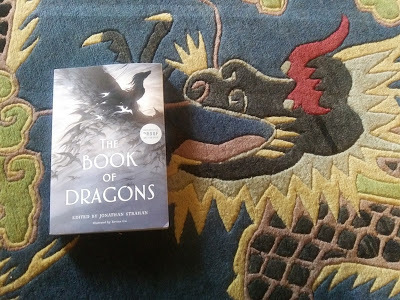
The Dragonstairs Press rug dragon is particularly happy today because I've received an advance copy of Jonathan Strahan's newest anthology, The Book of Dragons. Which will be published this summer. I know it's a bit of a wait, but that's how publishing works.
I don't often have stories in theme anthologies because, with the occasional happy exception, I'm one damnably slow writer. Jonathan, however, was able to pry a story out of me through the simple expedient of giving me lots and lots of time to write it--well over a year, in fact.
Luckily, I had a dragon story I'd been working on for two or three years. Here's how "Dragon Slayer" begins:
Every road and open doorway is a constant danger to a man of wandering disposition. Olav had stood on the threshold of his cottage one spring morning and the road had looked so fine that he couldn’t resist setting foot on it, and the next thing he knew it had carried him to the sea. There he chanced upon a merchant ship in need of a new hand. He learned the sailoring trade, fought pirates, killed a kraken, grew a beard, pierced an ear, and one memorable night won a handful of rubies at a single turn of the cards and lost them all to a barmaid who doped his ale. Two years later, he was shipwrecked off Thule and briefly married to a witch-woman who had blackwork tattoos on her face and had filed her teeth to points.
The opening came fast. I wrote it in a day. But it took me forever to find out what the story was about. Luckily, that nice Mr. Strahan came along with his invitation to participate in his book and that jogged something loose. A whirlwind twelve months later, the story was finished.
I imagine, though, that you're curious about the rest of the stories. Well, I haven't yet read them all. But those I have read were good. For more detail, I'm afraid you'll have to refer to the official press release. As follows:
From China to Europe, Africa to North America, dragons have long captured our imagination in myth and legend. Whether they are rampaging beasts awaiting a brave hero to slay or benevolent sages who have much to teach humanity, dragons are intrinsically connected to stories of creation, adventure, and struggle beloved for generations.
Bringing together nearly thirty stories and poems from some of the greatest science fiction and fantasy writers working today— Garth Nix, Scott Lynch, R.F. Kuang, Ann Leckie & Rachel Swirsky, Daniel Abraham, Peter S. Beagle, Beth Cato, Zen Cho, C. S. E Cooney, Aliette de Bodard, Kate Elliott, Theodora Goss, Ellen Klages, Ken Liu, Patricia A McKillip, K. J. Parker, Kelly Robson, Michael Swanwick, Jo Walton, Elle Katharine White, Jane Yolen, Kelly Barnhill, Brooke Bolander, Sarah Gailey, and J. Y. Yang—and illustrated by award-winning artist Rovina Cai with black-and-white line drawings specific to each entry throughout, this extraordinary collection vividly breathes fire and life into one of our most captivating and feared magical creatures as never before and is sure to become a treasured keepsake for fans of fantasy, science fiction, and fairy tales.

Immediately above: I couldn't resist including the rug dragon in the top photo, even though that downplays the very fine cover art by Rovina Cai. To make up for that, here's the upper half of that cover.

The Dragonstairs Press rug dragon is particularly happy today because I've received an advance copy of Jonathan Strahan's newest anthology, The Book of Dragons. Which will be published this summer. I know it's a bit of a wait, but that's how publishing works.
I don't often have stories in theme anthologies because, with the occasional happy exception, I'm one damnably slow writer. Jonathan, however, was able to pry a story out of me through the simple expedient of giving me lots and lots of time to write it--well over a year, in fact.
Luckily, I had a dragon story I'd been working on for two or three years. Here's how "Dragon Slayer" begins:
Every road and open doorway is a constant danger to a man of wandering disposition. Olav had stood on the threshold of his cottage one spring morning and the road had looked so fine that he couldn’t resist setting foot on it, and the next thing he knew it had carried him to the sea. There he chanced upon a merchant ship in need of a new hand. He learned the sailoring trade, fought pirates, killed a kraken, grew a beard, pierced an ear, and one memorable night won a handful of rubies at a single turn of the cards and lost them all to a barmaid who doped his ale. Two years later, he was shipwrecked off Thule and briefly married to a witch-woman who had blackwork tattoos on her face and had filed her teeth to points.
The opening came fast. I wrote it in a day. But it took me forever to find out what the story was about. Luckily, that nice Mr. Strahan came along with his invitation to participate in his book and that jogged something loose. A whirlwind twelve months later, the story was finished.
I imagine, though, that you're curious about the rest of the stories. Well, I haven't yet read them all. But those I have read were good. For more detail, I'm afraid you'll have to refer to the official press release. As follows:
From China to Europe, Africa to North America, dragons have long captured our imagination in myth and legend. Whether they are rampaging beasts awaiting a brave hero to slay or benevolent sages who have much to teach humanity, dragons are intrinsically connected to stories of creation, adventure, and struggle beloved for generations.
Bringing together nearly thirty stories and poems from some of the greatest science fiction and fantasy writers working today— Garth Nix, Scott Lynch, R.F. Kuang, Ann Leckie & Rachel Swirsky, Daniel Abraham, Peter S. Beagle, Beth Cato, Zen Cho, C. S. E Cooney, Aliette de Bodard, Kate Elliott, Theodora Goss, Ellen Klages, Ken Liu, Patricia A McKillip, K. J. Parker, Kelly Robson, Michael Swanwick, Jo Walton, Elle Katharine White, Jane Yolen, Kelly Barnhill, Brooke Bolander, Sarah Gailey, and J. Y. Yang—and illustrated by award-winning artist Rovina Cai with black-and-white line drawings specific to each entry throughout, this extraordinary collection vividly breathes fire and life into one of our most captivating and feared magical creatures as never before and is sure to become a treasured keepsake for fans of fantasy, science fiction, and fairy tales.

Immediately above: I couldn't resist including the rug dragon in the top photo, even though that downplays the very fine cover art by Rovina Cai. To make up for that, here's the upper half of that cover.
*
Published on February 10, 2020 08:15
February 7, 2020
It Lives Again! The Periodic Table of Science Fiction
.

One of the questions I get asked most often is whether The Periodic Table of Science Fiction will ever come back into print.
As some here may remember, years ago I wrote 118 works of flash fiction, one for every element in the periodic table, which were published once a week on Eileen Gunn's wonderful e-zine The Infinite Matrix. Some of the stories were funny, some snarky, some serious. Here's one:
HHydrogen1.00197The Hindenburg
Time agents like to rendezvous at famous disasters. It goes with the personality. They don’t trust you to remember the date otherwise.
Which was why I met Ivan at Lakehurst Naval Air Base, on the day the Hindenburg was due to burst into flame.
We were in the CO’s office – don’t think that wasn’t hard to arrange – when he gave his report. “Herr Eidenbenz wouldn’t listen to reason. So I left my briefcase under his couch and made an anonymous call to the Gestapo. He died under interrogation three days later.” Ivan grinned incandescently. “No atom bomb for Uncle Adolph.”
“Good work.” I’m Jewish myself, and if it were up to me, Hitler would be strangled at birth. But we’d tried that once, and only made matters worse. Now we rely on men like Ivan, one-in-a-billion talents who are able to remember multiple pasts, and so guide events toward the desired future. “Have a drink.”
I poured us each some of the commander’s bourbon. Through the window I could see the great zeppelin, so large and placid, moving with slow grace toward the mooring tower. It was a creepy moment for me, knowing how many people were about to die.
We clicked glasses. “Poor Eidenbenz,” I said. “Does it bother you, all the pain we inflict on innocents like him?”
“Are you nuts? I make history turn cartwheels. It’s like being a god!” He gestured toward the zeppelin. “You people are no more distinct to me than so many hydrogen atoms. You rush about and bump furiously into each other, and what difference do any of you make to where the airship goes?“Me, I can do anything I like, and who’s to stop me? You can’t even tell what I’ve done. You forget, and think it was always so.”
He took out a pocket detonator and punched the button. Outside, there were sudden shouts of alarm. “You even forget I did this.”
The flames from the burning Hindenburg cast a Satanic glow over his features.
He smiled. “Oh,” he murmured, “the humanity.”
*
When the series was finished, PS Publishing picked it up and made quite a lovely hardcover book of it. The book sold out almost immediately and, well, that was that. Much to the annoyance of a number of chemistry-lovers who wanted a copy.
Which is why I am elated today to be able to tell you that, yes, it's coming back into print. A paperback edition is forthcoming from PS Publishing and you can pre-order a copy here.
(Note: the page lists the pubdate as January 2020. Not so. But it's coming soon, so there won't be a long wait. And I'll let you know when the book goes live.)
And as long as you're splurging on my books . . .
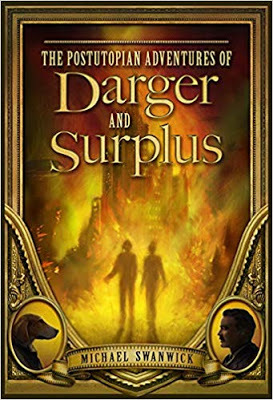
The Postutopian Adventures of Darger and Surplus, which collects all the short fiction written to date about the two admittedly charming scoundrels, comes out in April. Why not pre-order a copy now?
The book is, as you can see, a stunner.
This is, admittedly a volume book--only five stories, four flash fictions and an afterword, and priced for collectors. But if you want it, and can afford it, it's a good buy. Subterranean Press makes wonderful books.
You can find ordering information here. Or go to Subterranean's main page and wander about, marveling. And of course, it's also available from all the usual platforms. Your local bookstore would probably appreciate the order too.
And of Course . . .
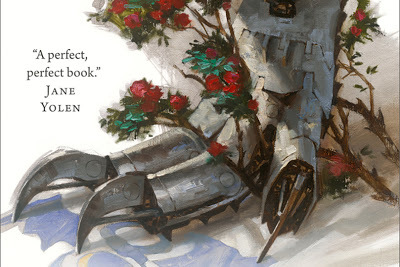
The Iron Dragon's Mother is still available in hardback. Just the other day, in Locus, reviewer-and-editor Jonathan Strahan wrote:
I'm still Old School enough to be a little uncomfortable recommending my own work. But what the hey. I wrote the book intending it to be everything I love about fantasy and in the hope that other readers would respond to it with joy.
So I recommend it too. If a hardcover book isn't in your budget this month, there's always Interlibrary Loan. I'm a big fan of Interlibrary Loan.
*

One of the questions I get asked most often is whether The Periodic Table of Science Fiction will ever come back into print.
As some here may remember, years ago I wrote 118 works of flash fiction, one for every element in the periodic table, which were published once a week on Eileen Gunn's wonderful e-zine The Infinite Matrix. Some of the stories were funny, some snarky, some serious. Here's one:
HHydrogen1.00197The Hindenburg
Time agents like to rendezvous at famous disasters. It goes with the personality. They don’t trust you to remember the date otherwise.
Which was why I met Ivan at Lakehurst Naval Air Base, on the day the Hindenburg was due to burst into flame.
We were in the CO’s office – don’t think that wasn’t hard to arrange – when he gave his report. “Herr Eidenbenz wouldn’t listen to reason. So I left my briefcase under his couch and made an anonymous call to the Gestapo. He died under interrogation three days later.” Ivan grinned incandescently. “No atom bomb for Uncle Adolph.”
“Good work.” I’m Jewish myself, and if it were up to me, Hitler would be strangled at birth. But we’d tried that once, and only made matters worse. Now we rely on men like Ivan, one-in-a-billion talents who are able to remember multiple pasts, and so guide events toward the desired future. “Have a drink.”
I poured us each some of the commander’s bourbon. Through the window I could see the great zeppelin, so large and placid, moving with slow grace toward the mooring tower. It was a creepy moment for me, knowing how many people were about to die.
We clicked glasses. “Poor Eidenbenz,” I said. “Does it bother you, all the pain we inflict on innocents like him?”
“Are you nuts? I make history turn cartwheels. It’s like being a god!” He gestured toward the zeppelin. “You people are no more distinct to me than so many hydrogen atoms. You rush about and bump furiously into each other, and what difference do any of you make to where the airship goes?“Me, I can do anything I like, and who’s to stop me? You can’t even tell what I’ve done. You forget, and think it was always so.”
He took out a pocket detonator and punched the button. Outside, there were sudden shouts of alarm. “You even forget I did this.”
The flames from the burning Hindenburg cast a Satanic glow over his features.
He smiled. “Oh,” he murmured, “the humanity.”
*
When the series was finished, PS Publishing picked it up and made quite a lovely hardcover book of it. The book sold out almost immediately and, well, that was that. Much to the annoyance of a number of chemistry-lovers who wanted a copy.
Which is why I am elated today to be able to tell you that, yes, it's coming back into print. A paperback edition is forthcoming from PS Publishing and you can pre-order a copy here.
(Note: the page lists the pubdate as January 2020. Not so. But it's coming soon, so there won't be a long wait. And I'll let you know when the book goes live.)
And as long as you're splurging on my books . . .

The Postutopian Adventures of Darger and Surplus, which collects all the short fiction written to date about the two admittedly charming scoundrels, comes out in April. Why not pre-order a copy now?
The book is, as you can see, a stunner.
This is, admittedly a volume book--only five stories, four flash fictions and an afterword, and priced for collectors. But if you want it, and can afford it, it's a good buy. Subterranean Press makes wonderful books.
You can find ordering information here. Or go to Subterranean's main page and wander about, marveling. And of course, it's also available from all the usual platforms. Your local bookstore would probably appreciate the order too.
And of Course . . .

The Iron Dragon's Mother is still available in hardback. Just the other day, in Locus, reviewer-and-editor Jonathan Strahan wrote:
The book of 2019 I loved most that no-one else seemed to be raving about (even though they should have been) was Michael Swanwick's The Iron Dragon's Mother. Ostensibly the third in a trilogy, in truth it's a standalone tale of a post-industrial fantasy which I loved very much and recommend.
I'm still Old School enough to be a little uncomfortable recommending my own work. But what the hey. I wrote the book intending it to be everything I love about fantasy and in the hope that other readers would respond to it with joy.
So I recommend it too. If a hardcover book isn't in your budget this month, there's always Interlibrary Loan. I'm a big fan of Interlibrary Loan.
*
Published on February 07, 2020 07:30
February 6, 2020
Lost in America With Paul Barnett
.
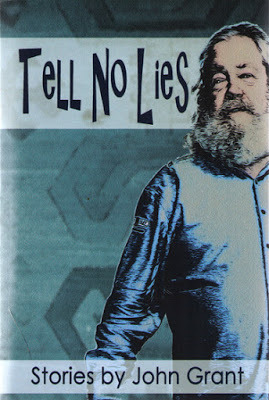
So there I am, somewhere in the wilds of Long Island, in a car with Paul Barnett and Pamela Scoville. A convention is involved. We're on a quest to get a bottle of wine or a pizza or something like that. Marianne is back in the hotel. And when we've snagged the Whatever and head home, it quickly becomes obvious that we're lost.
We're lost and we've left the only person with a sense of direction in the hotel.
So, map on lap, I call Marianne and tell here where, to the best of our reckoning we are. "You're heading the wrong way," she says. "Get turned around, get onto the highway, and head south."
Ten minutes later, I call again. "The ocean is in front of us."
"You went the wrong way on the highway. You wanted to go south."
Eight minutes later: "No, don't go that way. That's the opposite of where you want to go."
Then, "How the hell could you possibly be there?"
It took us something like an hour and a half to make our way back to the hotel. Imagine what it was like in that car. The exasperation. The dark recriminations. The fists hammered on the dash. It was a recipe for misery.
Except it wasn't. We were all three laughing almost constantly about our inability to follow directions, the perverse brilliance of our mistakes, and what Marianne must be thinking about us every time her phone rang. In between which, the conversation sparkled. (Paul and Pam knew pretty much everything.) It was wonderfully fun.
I can't think of anyone I'd rather be lost in America with than Paul and Pam. Except Marianne. But then, I wouldn't be lost. Because she has a sense of direction.
And now Paul is gone. Every now and then, he and I would reminisce about how we'd turned a ten-minute chore into a shambolic saga of incompetence. In the back of our heads, I think we expected that someday we'd repeat the experience. Alas, that will never happen now.
But for one fleeting Camelot-like hour, the world was as it should be, even the disasters were enjoyable, and the company was beyond compare.
Farewell, Paul. Remember to move toward the light.
And the best way of remembering a writer is . . .
Paul wrote an astonishing number of books, both fiction and fact. (Just his work co-writing The Encyclopedia of Science Fiction and The Encyclopedia of Fantasy would be enough to occupy an ordinary writer full-time.) You can find his tally of them here, though it will take some wandering around. If you want to honor his life, consider buying one and reading it. Or use the library. That's cool too.
If you're a writer, though, you should immediately get Discarded Science, Corrupted Science, and Bogus Science, authoritative accounts of entertaining ideas that simply aren't true, written under his John Grant pseudonym. If you can read one of those books and not get a story idea out of it, you're made of sterner stuff than I am.
Above: You could also read some of Paul's short fiction. I stand in awe of how prolific he was.
*

So there I am, somewhere in the wilds of Long Island, in a car with Paul Barnett and Pamela Scoville. A convention is involved. We're on a quest to get a bottle of wine or a pizza or something like that. Marianne is back in the hotel. And when we've snagged the Whatever and head home, it quickly becomes obvious that we're lost.
We're lost and we've left the only person with a sense of direction in the hotel.
So, map on lap, I call Marianne and tell here where, to the best of our reckoning we are. "You're heading the wrong way," she says. "Get turned around, get onto the highway, and head south."
Ten minutes later, I call again. "The ocean is in front of us."
"You went the wrong way on the highway. You wanted to go south."
Eight minutes later: "No, don't go that way. That's the opposite of where you want to go."
Then, "How the hell could you possibly be there?"
It took us something like an hour and a half to make our way back to the hotel. Imagine what it was like in that car. The exasperation. The dark recriminations. The fists hammered on the dash. It was a recipe for misery.
Except it wasn't. We were all three laughing almost constantly about our inability to follow directions, the perverse brilliance of our mistakes, and what Marianne must be thinking about us every time her phone rang. In between which, the conversation sparkled. (Paul and Pam knew pretty much everything.) It was wonderfully fun.
I can't think of anyone I'd rather be lost in America with than Paul and Pam. Except Marianne. But then, I wouldn't be lost. Because she has a sense of direction.
And now Paul is gone. Every now and then, he and I would reminisce about how we'd turned a ten-minute chore into a shambolic saga of incompetence. In the back of our heads, I think we expected that someday we'd repeat the experience. Alas, that will never happen now.
But for one fleeting Camelot-like hour, the world was as it should be, even the disasters were enjoyable, and the company was beyond compare.
Farewell, Paul. Remember to move toward the light.
And the best way of remembering a writer is . . .
Paul wrote an astonishing number of books, both fiction and fact. (Just his work co-writing The Encyclopedia of Science Fiction and The Encyclopedia of Fantasy would be enough to occupy an ordinary writer full-time.) You can find his tally of them here, though it will take some wandering around. If you want to honor his life, consider buying one and reading it. Or use the library. That's cool too.
If you're a writer, though, you should immediately get Discarded Science, Corrupted Science, and Bogus Science, authoritative accounts of entertaining ideas that simply aren't true, written under his John Grant pseudonym. If you can read one of those books and not get a story idea out of it, you're made of sterner stuff than I am.
Above: You could also read some of Paul's short fiction. I stand in awe of how prolific he was.
*
Published on February 06, 2020 07:19
January 29, 2020
The Iron Dragon's Mother and the Matter of America
.
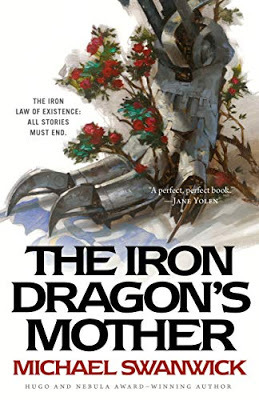
The Iron Dragon's Mother received a long, detailed, and (for me at least) gratifying review in The Los Angeles Review of Books recently. So of course I'm going to share parts of it here with you.
The author of the piece, Sean Guynes, titled it "The Matter of America: On Michael Swanwick's 'The Iron Dragon's Mother'" and, really, it's more of an analysis than a review. Which is welcome when, as here, the book being analyzed is recognizable as such. (This doesn't always happen. I could tell you stories!) Here's how it begins:
Then, after exploring the novel, its predecessors, and the process by which I arrived at it, Guynes reaches the heart of his thesis:
And of course he goes on from there, but now I've told you enough for you to know if you're interested in reading the entirety of the essay.
It is perhaps doing this very thoughtful essay a violence to end by suggesting that part of it would make quite a charming blurb. But I cannot resist. Here it is:
Isn't that great? This is, incidentally, the first critical piece to look at all three novels of the Iron Dragon/Industrialized Faerie trilogy.
You can read the entire review here.
*

The Iron Dragon's Mother received a long, detailed, and (for me at least) gratifying review in The Los Angeles Review of Books recently. So of course I'm going to share parts of it here with you.
The author of the piece, Sean Guynes, titled it "The Matter of America: On Michael Swanwick's 'The Iron Dragon's Mother'" and, really, it's more of an analysis than a review. Which is welcome when, as here, the book being analyzed is recognizable as such. (This doesn't always happen. I could tell you stories!) Here's how it begins:
SCHOLARS OFTEN ORGANIZE the medieval literature of Western Europe into three major cycles: the Matter of Britain, about King Arthur and his associates; the Matter of France, about Charlemagne and his confrères; and the Matter of Rome, about Roman (and occasionally Greek) history and mythology.
Then, after exploring the novel, its predecessors, and the process by which I arrived at it, Guynes reaches the heart of his thesis:
The Iron Dragon’s Mother is explicitly concerned with the American contexts of fantasy, with the very question of how to write in a genre that (arguably) depends upon the depth and autochthony of myth while feeling as many white Americans do, not unproblematically, that they have no culture, no myth, no history beyond, for example, family stories of relatively recent immigration to the United States.
And of course he goes on from there, but now I've told you enough for you to know if you're interested in reading the entirety of the essay.
It is perhaps doing this very thoughtful essay a violence to end by suggesting that part of it would make quite a charming blurb. But I cannot resist. Here it is:
The Iron Dragon’s Mother is gleefully unreliable, offering the happiest ending to his Faerie trilogy possible — one with little death, an empowered protagonist, and a playful revelation. But only if you don’t think too hard about it.
Isn't that great? This is, incidentally, the first critical piece to look at all three novels of the Iron Dragon/Industrialized Faerie trilogy.
You can read the entire review here.
*
Published on January 29, 2020 14:33
January 17, 2020
Valentine Moons -- SOLD OUT!
.

Look what my sweetie gave me! Marianne Porter has created a chapbook for Valentine's Day--Valentine Moons. And I was the very first person to receive one!
I think she's sweet on me.
Okay, yes, I was the one who wrote the ten lunar vignettes the chapbook contains. It makes no difference. There's something about receiving a valentine from someone you love that just takes your breath away. Knowing it's coming makes no difference. Like love itself, this is nothing we have any control over.
Here's the description from the website:
Shipped domestically, $12. Internationally, $13.
You can find Dragonstairs Press (and place an order, if you'd like) here.
But a word to the wise. The chapbooks went on sale late last night and already they're almost entirely gone. If you want one, you'd best move fast.
And in late-breaking news . . .
Truer words than the above were never writ. Marianne's really charming chapbooks are all sold. In less than one day, I might well and proudly add.
*

Look what my sweetie gave me! Marianne Porter has created a chapbook for Valentine's Day--Valentine Moons. And I was the very first person to receive one!
I think she's sweet on me.
Okay, yes, I was the one who wrote the ten lunar vignettes the chapbook contains. It makes no difference. There's something about receiving a valentine from someone you love that just takes your breath away. Knowing it's coming makes no difference. Like love itself, this is nothing we have any control over.
Here's the description from the website:
Dragonstairs celebrates Valentine's Day! Ten romantic, moony vignettes. 5 ½ by 5 ½ inches. Double wrapper, the outer made of Desert Rose handmade paper from Alexandra Soteriou at worldpaperusa.com, with an eccentrically placed replica of a 19th century Queen of Hearts. Brochure stitch with a red ribbon. Issued in an edition of 40, of which 32 6 are available for sale.
Shipped domestically, $12. Internationally, $13.
You can find Dragonstairs Press (and place an order, if you'd like) here.
But a word to the wise. The chapbooks went on sale late last night and already they're almost entirely gone. If you want one, you'd best move fast.
And in late-breaking news . . .
Truer words than the above were never writ. Marianne's really charming chapbooks are all sold. In less than one day, I might well and proudly add.
*
Published on January 17, 2020 07:45
January 14, 2020
Chatting With Chip at the Rosenbach
.

Last Thursday, at the Rosenbach Museum & Library, your go-to place for when you need to check the original manuscript of James Joyce's Ulysses, I took part in a conversation about 1960s science fiction.
The occasion was the publication of the Library of America's American Science Fiction: Eight Classic Novels of the 1960s which includes Samuel R. Delany's Nova and the big draw was of course not me but Chip Delany himself.
(To answer your unspoken questions: No, the event was not recorded nor is it somehow available on the Web. The Rosenbach hopes to change that situation sometime in the future. but for now itour conversation as one with thee snows of yesterday.)
It was a good event. The room was filled and the audience was intelligent and attentive. Delany was his usual charming self. And I was, apparently, very very sincere.
A lot of interesting things were said. I'll share one of them here:
When Nova was first published it sold, to Delany's expressed amazement, for $10,000. This was a record for a science fiction novel at that time. Six months later (iirc), Do Androids Dream of Electric Sheep by Philip K. Dick went for five hundred dollars more. So when a Hollywood director decided he wanted to make a science fiction movie and told his people to buy the most valuable SF novel out there, they picked up PKD's.
Which is why, many years later, Blade Runner hit the silver screen instead of Chip's novel.
Now you know. Next time you're jaunting from parallel world to parallel world, be sure to check out the Ridley Scott version of Nova. It's a stunner.
Not sure I agree with what he did with the ending, though.
*

Last Thursday, at the Rosenbach Museum & Library, your go-to place for when you need to check the original manuscript of James Joyce's Ulysses, I took part in a conversation about 1960s science fiction.
The occasion was the publication of the Library of America's American Science Fiction: Eight Classic Novels of the 1960s which includes Samuel R. Delany's Nova and the big draw was of course not me but Chip Delany himself.
(To answer your unspoken questions: No, the event was not recorded nor is it somehow available on the Web. The Rosenbach hopes to change that situation sometime in the future. but for now itour conversation as one with thee snows of yesterday.)
It was a good event. The room was filled and the audience was intelligent and attentive. Delany was his usual charming self. And I was, apparently, very very sincere.
A lot of interesting things were said. I'll share one of them here:
When Nova was first published it sold, to Delany's expressed amazement, for $10,000. This was a record for a science fiction novel at that time. Six months later (iirc), Do Androids Dream of Electric Sheep by Philip K. Dick went for five hundred dollars more. So when a Hollywood director decided he wanted to make a science fiction movie and told his people to buy the most valuable SF novel out there, they picked up PKD's.
Which is why, many years later, Blade Runner hit the silver screen instead of Chip's novel.
Now you know. Next time you're jaunting from parallel world to parallel world, be sure to check out the Ridley Scott version of Nova. It's a stunner.
Not sure I agree with what he did with the ending, though.
*
Published on January 14, 2020 11:04
January 13, 2020
The Postutopian Adventures of Darger and Surplus
.

It's official! Subterranean Press has announced the April publication of The Postutopian Adventures of Darger and Surplus. The book collects all the short fiction I've written to date about my favorite con men at the dawning of a new age, sometime in the future.
This is an elegant and slim book. It contains four previously published stories, a quartet of linked flash fictions, and a story new to this collection titled, "There Was an Old Woman," which chronicles how Darger came to be eaten by a dragon and what happened next.
The book costs $40, which is not cheap--but is quite reasonable for a signed and numbered hardcover offered in an edition of one thousand.
It's available for preorder now. You can go to the link below or just begin at SP's home page here and wander around yearningly. There are some very desirable books there.
Here's what the website has to say:
Scoundrels and wit. It's hard to know which should come first in describing Michael Swanwick's stylish new collection, The Postutopian Adventures of Darger and Surplus. the first volume to center solely on his adventurers with, shall we say, a flexible moral position.
About the Book:
The world is grown strange.
Gloriana, the six-brained Queen of England, squats in her throne room at the center of Buckingham Labyrinth. In Paris, the glowing Seine may, or may not, conceal the disassembled remnants of the Eiffel Tower. A dragon haunts the high passes of the Germanic states, swallowing travelers whole for purposes impossible to understand. All these signs and portents together mean but one thing to the forgettable-faced Aubrey Darger and his humanoid canine partner Surplus.
There is money to be made.
Here are five novelettes and four never-before-collected vignettes that describe episodes from the careers of those most charming of con artists, Darger and Surplus, spiritual heirs to Fafhrd and the Grey Mouser and unwitting agents of change in a world where ancient artificial intelligences scheme to destroy the descendants of their makers. The comrades’ adventures across a wildly detailed world by turns astonish and delight.
The Hugo Award-winning “The Dog Says Bow-Wow” tells the tale of the redoubtable pair’s first confidence game, played out at the dizzying heights of English society. In “The Little Cat Laughed to See Such Sport,” Surplus works to overcome his prejudice against Darger’s new lover, a member of that most contemptible and capricious of races, cats. Gods walk a future Arcadia in “Girls and Boys Come Out to Play,” tables are turned by the formidable woman who lends her name as title to “Tawny Petticoats,” and Darger and Surplus are separated as each attempts to thwart the machinations of a most unique AI “There Was an Old Woman,” which debuts herein.
The collection closes with “Smoke and Mirrors,” four brief episodes that lend nuance to all that has come before, expanding our understanding and appreciation of this world and of these unforgettable roguish characters.
Michael Swanwick is one of the most celebrated and decorated writers of the past forty years. His novels and short stories have won the Hugo, the Nebula, the World Fantasy, the Locus, and the Theodore Sturgeon Awards, among others. His inimitable imagination and consummate skill are on full display in this collection, so revel in the postutopian world with its finest guides. Just check your pockets afterward.
Limited: 1000 signed numbered hardcover copies: $40
*

It's official! Subterranean Press has announced the April publication of The Postutopian Adventures of Darger and Surplus. The book collects all the short fiction I've written to date about my favorite con men at the dawning of a new age, sometime in the future.
This is an elegant and slim book. It contains four previously published stories, a quartet of linked flash fictions, and a story new to this collection titled, "There Was an Old Woman," which chronicles how Darger came to be eaten by a dragon and what happened next.
The book costs $40, which is not cheap--but is quite reasonable for a signed and numbered hardcover offered in an edition of one thousand.
It's available for preorder now. You can go to the link below or just begin at SP's home page here and wander around yearningly. There are some very desirable books there.
Here's what the website has to say:
Scoundrels and wit. It's hard to know which should come first in describing Michael Swanwick's stylish new collection, The Postutopian Adventures of Darger and Surplus. the first volume to center solely on his adventurers with, shall we say, a flexible moral position.
About the Book:
The world is grown strange.
Gloriana, the six-brained Queen of England, squats in her throne room at the center of Buckingham Labyrinth. In Paris, the glowing Seine may, or may not, conceal the disassembled remnants of the Eiffel Tower. A dragon haunts the high passes of the Germanic states, swallowing travelers whole for purposes impossible to understand. All these signs and portents together mean but one thing to the forgettable-faced Aubrey Darger and his humanoid canine partner Surplus.
There is money to be made.
Here are five novelettes and four never-before-collected vignettes that describe episodes from the careers of those most charming of con artists, Darger and Surplus, spiritual heirs to Fafhrd and the Grey Mouser and unwitting agents of change in a world where ancient artificial intelligences scheme to destroy the descendants of their makers. The comrades’ adventures across a wildly detailed world by turns astonish and delight.
The Hugo Award-winning “The Dog Says Bow-Wow” tells the tale of the redoubtable pair’s first confidence game, played out at the dizzying heights of English society. In “The Little Cat Laughed to See Such Sport,” Surplus works to overcome his prejudice against Darger’s new lover, a member of that most contemptible and capricious of races, cats. Gods walk a future Arcadia in “Girls and Boys Come Out to Play,” tables are turned by the formidable woman who lends her name as title to “Tawny Petticoats,” and Darger and Surplus are separated as each attempts to thwart the machinations of a most unique AI “There Was an Old Woman,” which debuts herein.
The collection closes with “Smoke and Mirrors,” four brief episodes that lend nuance to all that has come before, expanding our understanding and appreciation of this world and of these unforgettable roguish characters.
Michael Swanwick is one of the most celebrated and decorated writers of the past forty years. His novels and short stories have won the Hugo, the Nebula, the World Fantasy, the Locus, and the Theodore Sturgeon Awards, among others. His inimitable imagination and consummate skill are on full display in this collection, so revel in the postutopian world with its finest guides. Just check your pockets afterward.
Limited: 1000 signed numbered hardcover copies: $40
*
Published on January 13, 2020 14:04
Michael Swanwick's Blog
- Michael Swanwick's profile
- 546 followers
Michael Swanwick isn't a Goodreads Author
(yet),
but they
do have a blog,
so here are some recent posts imported from
their feed.



